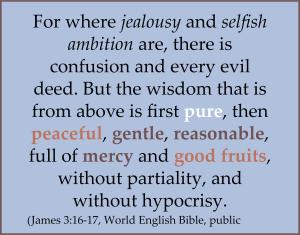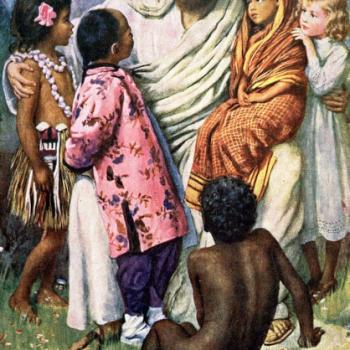Last in the Happiness series – wisdom
There is a saying among professionals that some people know just enough to be dangerous. Self-medical diagnosis, self-architects, and self-representation in court come to mind. I’ve seen how these end. And it’s a common thing for people to get just a little information about happiness and think they know it all.
For some it’s religious knowledge that convinces them they know everything about being happy. There is much wisdom in the Bible. Wisdom is wrought by trial by fire. The ancients followed the wisdom in the Word of God and saw it work in their lives. However, we don’t become wise through reading it but through doing it and proving it to ourselves.

The Bible is not a book of psychology (or any other field of knowledge). It doesn’t give us rules for gaining happiness. It tells us to follow God’s ways which boils down to how to treat other people. Follow God’s ways, shown to us by Jesus, and happiness will follow.
Since the 1970s I’ve heard religious people say that being happy is a moment, but joy is deep, trying to say happiness only comes from following God. There is no wisdom in this. There’s no difference – it’s semantics. Happiness isn’t giggles and laughs or momentary enjoyment of a gift. Happiness is a range of emotions from contentment to life satisfaction. Happiness goes all the way to the bone and radiates outward, especially when someone smiles. We find this happiness where we find it.
The Seasons and useless pursuits
Mark Twain (Samuel Clemens) observed in a letter, “We chase phantoms half the days of our lives. It is well if we learn wisdom even then, and save the other half.” – Letter to Orion Clemens, 21 February 1868
It seems to take half of our life to have the experiences necessary to understand and identify foolish shadows that offer nothing. A lot of happiness disappears into those shadows. But we have to pursue some to gain understanding.
King Solomon found the hard way that trying to understand God is misleading. Early on Solomon thought that wisdom was simply a useless pursuit. He said in Ecclesiastes 1:12-18 (NASB), “I, the Preacher, have been king over Israel in Jerusalem. And I set my mind to seek and explore by wisdom concerning all that has been done under heaven. It is a grievous task which God has given to the sons of men to be afflicted with. I have seen all the works which have been done under the sun, and behold, all is vanity [useless] and striving after wind. What is crooked cannot be straightened and what is lacking cannot be counted.
“In my vain life I have seen everything. There is a righteous man who perishes in his righteousness, and there is a wicked man who prolongs his life in his evildoing.
“I said to myself, ‘Behold, I have magnified and increased wisdom more than all who were over Jerusalem before me; and my mind has observed a wealth of wisdom and knowledge.’ And I set my mind to know wisdom and to know madness and folly; I realized that this also is striving after wind. Because in much wisdom there is much grief, and increasing knowledge results in increasing pain.”
My experience is similar to Solomon’s. I thought as a young adult that it would be great to be wise like Solomon. But you don’t gain wisdom through reading a book. You gain it through experience and reflecting on that experience. This is spiritual growth, and it’s often just as painful as Solomon said.
Maturity
When people spout knowledge at me, telling me they’re smart, I understand that one day those words will have a bitter taste in their mouth and will fester in their brain. Not that I want that. I eat my own words, too. Being smart is not wisdom. Smart means good at getting knowledge. Wisdom is knowledge proved by experience.
Solomon came to understand the difference. By chapter 8 of Ecclesiastes he had matured. “Who is like the wise? Who knows the explanation of things? A person’s wisdom brightens their face and changes its hard appearance.” – Ecclesiastes 8:1 (NIV)
Solomon went on to say to leave it to God to decide how to deal with people. No one can control the wind. The evil are allowed to prosper, but eventually their deeds take them away. So eat and to drink and be merry (enjoy your lives). Even if we are wise, we won’t gain understanding of everything that happens. – Ecclesiastes 8:1-17 (NASB)
When we dare question the mind of God, we see God lets people learn from experience and prove what kind of people they are, even letting them prosper from wrongful deeds. When we see the wicked prosper, we think life is unfair. Like Solomon, we see that even those who follow the ways of God sometimes suffer, while those who are selfish and even wicked seem to prosper. But we learn to not question too deeply. Our part is simply to help others. And for this our face shows our happiness.
Forgiveness is important
Hating others is like drinking poison and expecting the other person to die. It’s key to our own forgiveness.
“Do not [a]judge, and you will not be judged; and do not condemn, and you will not be condemned; pardon, and you will be pardoned.” – Luke 6:37 (NASB)
Desmund Tutu experienced all of Africa and its apartheid system that favored whites and left out blacks. It was horrendous injustice at which the world staggered. His theological stance became the life and death issues of the black man. But did he hold this against the whites?
“Until we can forgive the person who harmed us, that person will hold the keys to our happiness; that person will be our jailor. When we forgive, we take back control of our own fate and our feelings. … We forgive for ourselves.” – Archbishop Emeritus Desmond Tutu
Wisdom and happiness
It’s quite possible for someone to have a Ph.D and have not one whit of useful knowledge. Same for those with a lot of money and power. It’s also possible for those who have very little of things we admire, to be smarter than them all.
The only wise things I can say are that the more you know, the more you realize you don’t know, and that if you follow the ways shown to us by Jesus, you’ll be happy and that’s to the bone. These are expressed in the following poem.
The Fool’s Prayer (abbreviated)
By: Edward Rowland Sill (April 29, 1841 – February 27, 1887)
The royal feast was done; the King
Sought some new sport to banish care,
And to his jester cried: “Sir Fool,
Kneel now, and make for us a prayer!”
The jester doffed his cap and bells,
And stood the mocking court before;
They could not see the bitter smile
Behind the painted grin he wore.
He bowed his head, and bent his knee
Upon the monarch’s silken stool;
His pleading voice arose: “O Lord,
Be merciful to me, a fool!
“’T is not by guilt the onward sweep
Of truth and right, O Lord, we stay;
’T is by our follies that so long
We hold the earth from heaven away.
“These clumsy feet, still in the mire,
Go crushing blossoms without end;
These hard, well-meaning hands we thrust
Among the heart-strings of a friend.
“The ill-timed truth we might have kept—
Who knows how sharp it pierced and stung!
The word we had not sense to say—
Who knows how grandly it had rung!
“Earth bears no balsam for mistakes;
Men crown the knave, and scourge the tool
That did his will; but Thou, O Lord,
Be merciful to me, a fool.”
The room was hushed; in silence rose
The King, and sought his gardens cool,
And walked apart, and murmured low,
“Be merciful to me, a fool!”
Take Home Points
This series didn’t take the superficial route of forecasting happiness from platitudes. While platitudes contain bits of wisdom, enduring happiness is more deeply found in following the ways Jesus showed us, and going counter to these ways of God will bring deep anguish.
Happiness is also deeply affected by having control over our lives (being autonomous agents), being able to cope with and even embrace change, having an attitude of gratefulness instead of an attitude of poverty, having a sense of meaning and purpose, and not trying to understand and control every event in the universe. We can’t know the mind of God so it’s useless to try and understand everything. Change what we can.
“For the foolishness of God is wiser than mankind, and the weakness of God is stronger than mankind.” – 1 Corinthians 1:25 (NASB)
We are what we think. Wise words from the Apostle Paul: “Finally, brothers and sisters, whatever is true, whatever is noble, whatever is right, whatever is pure, whatever is lovely, whatever is admirable—if anything is excellent or praiseworthy—think about such things.” – Philippians 4:8 (NASB)
Series Links
Don’t worry, be happy – Part 1
Clues to making and accepting change
Controlling your destiny – change and happiness
Gratefulness Changes Everything
We Need to Start a Happiness Epidemic
Satisfaction with the material things we have
Satisfaction with our place in life
Depending on employers and the economy for happiness
Economic exploitation Robs Us of Happiness
Focusing on the right things – The Fools Wise Prayer
___________________
Our answer is God. God’s answer is us. Together we make the world better.
Dorian














